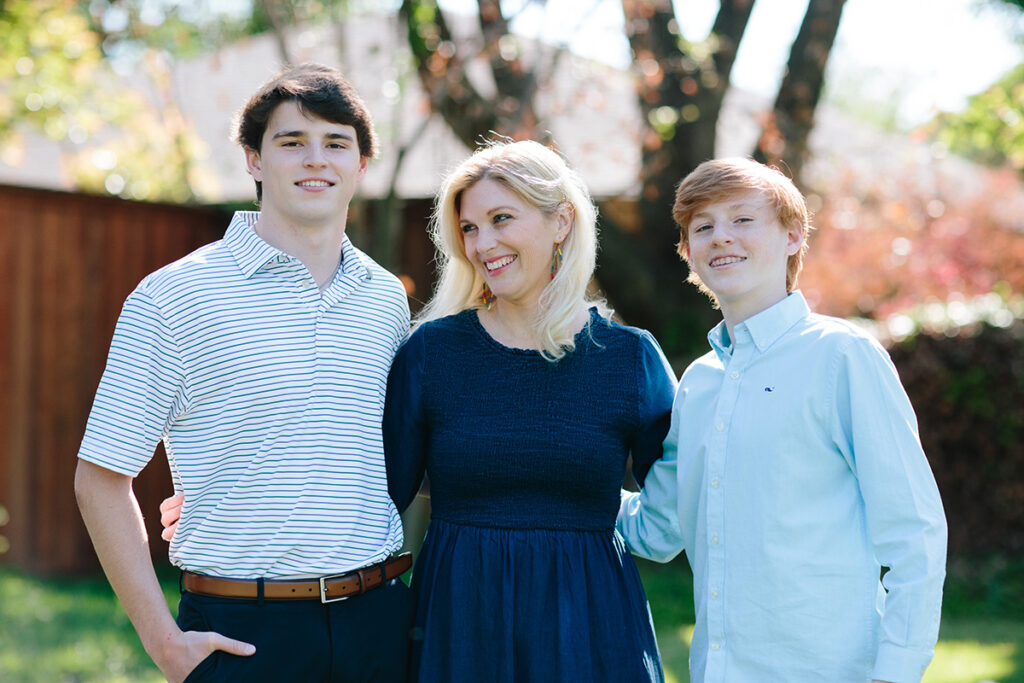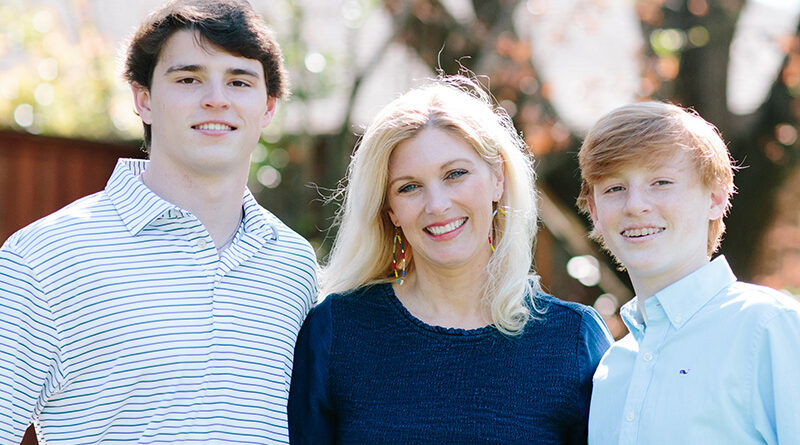Pandemic Experience Provides Lessons Through Family Conversations
Like most parents, Preston Hollow’s Sarah Naughton, found herself caught by surprise last spring in the early stages of the pandemic. Schools moved online at the same time that her job as senior director of events at Match also moved to work-from-home status.
“I really think last year has been a testament to the fact that things cannot always be 50/50. There were some days that I just had to give more attention to my kids as we adjusted,” she said. “And then, on the flip side, there were days when work was all-consuming, and at Match, we just had to adjust to a virtual environment like everyone else.”
She said having a supportive work environment, with everyone from the upper management down encouraging people to put family first, helped a lot.
“I had a husband who, all of a sudden, was occupying the home office. The kids were trying to figure out remote learning,” she recalled. “We’re all trying to figure out ‘where’s my space’ in the house, and in one moment, I became the lunch lady, the tech support, the school counselor, and also a manager concerned about the wellbeing of my own work team.
“So it was just a lot of things all at once, but never once did it cross my mind that I wouldn’t be able to manage both. Match really came through in big ways for me.”
Sarah Naughton

But in those months, her boys, who are now in eighth and 12th grades at Prince of Peace and Jesuit, got to see her and her husband working. They began asking questions. Her oldest, a senior at Jesuit, began asking more questions about the business world as he neared the college years.
“I think this has really opened up opportunities for deeper conversations,” she said. “We had to openly talk about what was happening, and it was unsettling and scary, and COVID personally impacted our family. We know families who have lost loved ones to this terrible virus. So I think the opportunity for more conversations that are tough meant that more so than a year ago, they’re comfortable with asking questions and talking about it, and they’re more cognizant of what’s going on in the world.”
Naughton said that although there were days she wouldn’t want to repeat, she and her family are more hopeful now, as many are.
“I would never want to go back to the days of the internet crashing, and there’s a paper due, and someone’s in the middle of a test — I would never want to relive that day,” she said, laughing. “But as a collective whole, I think that the things that have emerged from this have been so meaningful and important.
“Time moves on, and things are getting a little better with the vaccinations, and I think there’s this sense of hope that I see in my children, and I feel in myself. There’s a deeper appreciation, I think, for them and for us as a family.”
We talked to Naughton about parenting during the pandemic and more. Below is more of our conversation.
PN: Like most parents, the pandemic hit last Spring and you found yourself at home with your kids, needing to navigate both schooling for them and figuring out your own job and how to do that from home. How did that work?
Naughton: I really think last year has been a testament to the fact that things cannot always be 50/50. There were some days that I just had to give more attention to my kids as we adjusted. And then, on the flip side, there were days when work was all-consuming, and at Match, we just had to adjust to a virtual environment like everyone else. And we did that flawlessly, but at the same time, my personal life was in a state of flux.
I had a husband, who all of a sudden it was occupying the home office. Kids are trying to figure out the remote learning. We’re all trying to figure out where’s my space in the house. And in one moment I become the lunch lady, the techsupport, the school counselor, and also a manager concerned about the wellbeing of my own team.
So it was just a lot of things all at once, but never once did it cross my mind that I wouldn’t be able to manage both. Match really came through in big ways for me – and for our entire workforce. What I found from Match was just this collective understanding of what it means to balance a career and family. There’s this sincere understanding and appreciation that there’s more to me than my persona as a Match employee. I’m also a wife, a mother, a daughter, a sister, a friend, a volunteer. And so for me, there’s this constant blending of all people, things, and obligations that are important to me. And by placing that value on the whole me, the company knows that I’m going to thrive as a contributor.
There were days that it was hard. But I love what I do. I come to work challenged every day. But most importantly, I feel valued. And so when I was thrown into this, you know, utter chaos that we’ve, we’ve all experienced, just sort of the sense of calm that they had my back and they knew that I was going to get the job done, but that family came first and, and the art of sort of figuring out how to live collectively as a whole under one roof and all of us accomplish what we needed to accomplish.
PN: I know there’s been a lot of talk – and the statistics back this up – that this pandemic has been especially hard on women, and that we’ve seen a lot of women leave the workforce. Do you feel fortunate that you didn’t have to consider that?
Naughton: Oh, I mean, it was crushing because you see all of these headlines about women having to leave the workforce, this sort of mass exodus because they were not able to balance or juggle those two worlds — through no fault of their own, right. This is not anything that any of us had anticipated. And the fact that the ability to manage the entire obligation of family and work never was a consideration for me, I feel extremely blessed that I am part of a company where there’s even a sense of camaraderie, fierce loyalty to one another, and I’m surrounded by so many other working parents who get it. And so that, that empathy permeates our culture and it, you know, it’s crushing to hear that that’s not the way it is everywhere. I feel for other working moms who were replaced in the position to have to make that decision and that’s so, so tough because family does come first.
PN: Did you find yourself having to set up some boundaries at home when it came to how available you could be to your family when you were working?
Naughton: Absolutely. And with older children, it’s a little bit easier, but I even see it with my colleagues, but, but for me it was like, “OK kids — and dad — this is the world that we’re living in right now, where we’re all under one roof. We all have certain things that need to be done by the end of the day. And, you know, I will help you. And, but there are certain times where I need the space, I need to be left alone.”
And, and they honored that. Again, they’re older, so they get it. What I witnessed with some of my colleagues, we’ve got new parents that were giving birth to babies with during this pandemic and going on maternity leave, and those with toddlers and elementary school children. And it was fun, you know, looking back – it was a really fun way to sort of open the world of your coworkers outside of work. I’d see kids on the screen and I’d wave to them. I think we all became a lot more forgiving than I think we were pre-pandemic. I love, love being in a meeting and seeing a kiddo walk behind and grab a glass of water – it’s humanized the plight of the parent, I think, and while we’ve all done our best to build boundaries with children, they’re not always going to follow those. And for us, I think that’s OK. It’s OK if a kid pops up on a screen. It’s OK if we hear somebody crying in the background – that’s life, and it sort of humanizes everything. And it just emphasizes the fact that we’re all something beyond who we are sitting at a desk or sitting in a conference room.
PN: What do you think are some of the takeaways that your kids have come away with after all of this?
Naughton: I think the ability to adapt, and you know, that life does not always go the way that you anticipate and that you have to take what comes at you. And they did that. They did that on you a school level. They did it on a personal level. They did it on a family level. I think that they have also developed a sense of respect as a family, that there’s this broader understanding of who we all are as individuals. They see that dad is more than just dad – they see that dad’s contributing to a business, that he has co-workers, that he’s solving problems. I think they develop this sense of respect. It’s sort of beyond themselves. Kids – and rightfully so – they live n their own little siloed worlds – they’re concerned about their schoolwork, and their friends, and their activities and interests. And I really think this has opened up an opportunity for deeper conversations.
We had to openly talk about what was happening, and it was unsettling and scary, and COVID personally impacted our family. We know families who have lost loved ones to this terrible virus. So I think the opportunity for more conversations that are tough meant that more so than a year ago, they’re comfortable with asking questions and talking about it, and they’re more cognizant of what’s going on in the world.

For nearly 40 years, People Newspapers has worked tirelessly to tell the stories—good, bad, and sublime—of our neighbors in the Park Cities and Preston Hollow. To support our efforts, please contact advertise@peoplenewspapers.comfor advertising opportunities. Please also consider sharing this story with your friends and social media followers.









